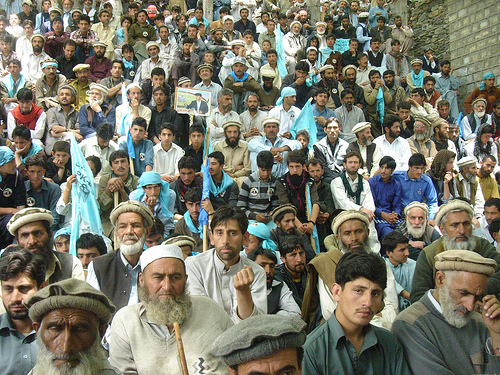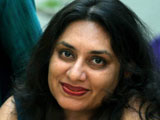Pakistan’s Weird Elections
Despite controversy, a nation whose political identity has been marred by violence and distrust has made its first democratic transition.

Supporters of the Pakistan Muslim League, the winning party in the recent parliamentary elections, gather at a campaign press conference. Despite a post-election vote-rigging controversy, Pakistan’s May 11 elections have been hailed by the European Union as a 'positive step for democracy' with a high voter turn-out. Photo: Ground Report via Flickr.
The Pakistani parliamentary elections took place on May 11 this year. The event marks the first time in Pakistan’s history that a civilian government has handed off power to another, democratically elected civilian government. The entire world watched as Pakistan went to the polls, treating the exercise as a huge experiment in a nation that’s been written off as a basket case, a banana republic, and a terrorist haven in recent years. And Pakistan didn’t disappoint, producing what could rightfully be called one of the weirdest elections the world has ever seen.

- Pakistan is a country of contradictions – full of promise for growth, modernity and progress, yet shrouded by political, social and cultural issues that undermine its quest for identity and integrity. My bi-monthly column “Pakistan Unveiled” presents stories that showcase the Pakistani struggle for freedom of expression, an end to censorship, and a more open and balanced society.

- Bina Shah is a Karachi-based journalist and fiction writer and has taught writing at the university level. She is the author of four novels and two collections of short stories. She is a columnist for two major English-language newspapers in Pakistan, The Dawn and The Express Tribune, and she has contributed to international newspapers including The Independent, The Guardian, and The International Herald Tribune. She is an alumnus of the International Writers Workshop (IWP 2011).
Even at the best of times elections are dramatic events, but in Pakistan someone always manages to up the ante. This time it was the Taliban, who threatened to disrupt polls by launching suicide attacks on voting stations. The election campaigns were no less dramatic, with rumors that vote-rigging, bribes, and vote-buying were happening on a massive scale, as if the elections were some kind of sport in the Dishonesty Olympics.
As if that weren’t enough, barely a few days before the end of the campaigns, former cricketer-turned-politician Imran Khan fell off an elevated platform and broke his back in two places. He conducted his last election speech from his hospital bed. In another camp, one of Nawaz Sharif’s mascots, a white tiger, was rumored to have mysteriously died on the eve of the elections; but that didn’t stop Sharif’s party, the Pakistan Muslim League, from sweeping to victory in the National Assembly.
Despite great doubts about whether these elections would be truly free and fair, people came out to vote in great numbers, reaching an average 60% voter turnout across the nation—better than the mediocre numbers of even the world’s most developed nations. To this end, social media greatly influenced on-the-ground campaigns, with party officials altering their strategies, and voters mobilizing based on what was being reported in real-time on Twitter and Facebook.
Young people showed their patriotic spirit, surpassing the cynicism of older Pakistanis, and urged one another via text message and email to get out and vote; they then plastered Facebook with pictures of their inked thumbs and happy grins. But other kinds of documentation also popped up on the internet: Videos showing election officers stuffing ballot boxes with pre-stamped ballots, photographs capturing open ballot boxes on the street, votes strewn like garbage across the ground. While the images themselves can be disheartening, social media helped further the cause of transparent elections by illustrating that the Election Commission of Pakistan had completely failed at its job.
One of the happiest phenomena has been the fact that more women than ever turned out to participate in the elections—especially young women, who were more educated than their elders and more eager to vote for change in their country. And yet, as if to try and turn back an unstoppable tide, in the Upper and Lower Dir districts of Khyber Pakhtunkhwa, a document signed by all the major political parties banned women from voting. This agreement knocked out at least 40% of the voters in these districts. I failed to find an official translation of the document, which came to light after initial reports of only a verbal agreement (no doubt because they didn’t want the international media to get ahold of it), but I was told the document included the statement that women should not vote for candidates who were not their mehrams (the Arab word for male guardian or male blood relative) or they’d risk losing their legitimate husbands. The document does not specify in what manner they would lose their husbands, but I imagine some wormhole opening up in the universe to swallow them whole…
Now in the post-election haze, the nation is mired in a rigging controversy. The allegations have left all the major parties tarnished as they’ve been refusing to accept one another’s mandates in the various provinces. Who can blame anyone for being suspicious when the results show, for example, 170,000 votes in favor of one candidate and exactly zero votes in favor of the other? Or when 700 registered voters manage to produce 900 votes in the ballot box? Mathematics, it seems, has never been Pakistan’s strong suit.
These elections could not be called normal by any stretch of the imagination. Politics has always been a strange game in Pakistan, and perhaps the way we conducted our elections is symptomatic of this. But these weird elections prove that we in Pakistan have finally tasted democracy and learned the true meaning of elections: That everybody will be left feeling equally unhappy with the results.





One Comment on "Pakistan’s Weird Elections"
Today I have started reading again and will hopefully not miss any of your write-ups again.